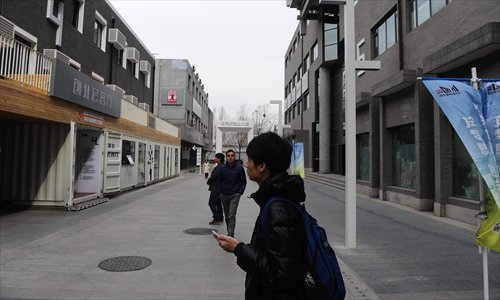Premier calls for focus on employment
Jobs vital for growth, says Li

Pedestrians walk on the Zhongguancun Innovation Street. Photo: IC
Premier Li Keqiang emphasized the importance of employment on Thursday during a visit to Zhongguancun, a hub for IT sales and start-ups in Beijing's Haidian district.
"In order to encourage people to start their own businesses and make innovations, we need to rely on employment first. Creating jobs is the foundation of everything," Li was quoted as saying in a Weibo posting by the Administrative Committee of Zhongguancun Science Park on Thursday.
The premier was joined on his visit by Liu Chuanzhi, founder of Lenovo, the world's largest PC maker in terms of shipments. Li made a tour along the 200-meter-long Zhongguancun Innovation Street, talking with various entrepreneurs, including staff at 3W Coffee, a start-up Internet cafe.
The street, which was once home to stores selling books and clothes, opened in June 2014 and now has 20 agencies offering services to start-ups and 400 entrepreneurial companies, according to media reports.
"Premier Li's visit indicates that the central government is paying close attention to start-ups, which will further boost entrepreneurship and innovation in the Zhongguancun area," Wang Danqing, a partner with Beijing-based ACG Management Consultancy, told the Global Times Thursday.
In order to encourage innovation and job creation, the State Council on May 1 rolled out new guidelines for employment and entrepreneurship, promising loans of up to 100,000 yuan ($16,300) for each start-up and helping to cover some interest payments.
These measures will support consumption and social stability, while fostering the private sector as a driver of economic growth, the Xinhua News Agency reported on Thursday, citing a report by global rating agency Moody's Investors Service.
Since 2010, China has launched a series of policies related to finance, taxation and research and development funding in Zhongguancun, making it a national innovation demonstration zone, according to media reports.
More favorable policies for start-ups in Zhongguancun will be rolled out soon, said Wang.
After the visit, shares in Beijing Centergate Technologies (Holding) Co, a company responsible for infrastructure construction in the Zhongguancun area, rose 7.4 percent to 13.64 yuan on the Shenzhen bourse, even though the Shenzhen Component Index dipped by 0.15 percent on Thursday.
It is not the first time Li has emphasized the importance of employment.
While delivering the 2015 government work report on March 5 during the two sessions, meetings of the country's top legislature and the political consultative body, Li said that the main purpose of maintaining stable growth was to ensure employment.
Wang noted that China is facing pressure to create enough new jobs amid the economic slowdown.
China created 3.24 million new jobs in urban areas during the first three months, 200,000 less than in the same period in 2014, said Li Zhong, a spokesperson for the Ministry of Human Resources and Social Security, during a press conference held in Beijing on April 24.
For 2015, China has set a GDP growth target of around 7 percent and a CPI target of around 3 percent in order to help create over 10 million new jobs in urban areas, according to Li's work report. China currently has a workforce of 900 million people, the report said.
Chen Naixing, head of the SME Research Center under the Chinese Academy of Social Sciences, told the Global Times Thursday that GDP will not reach the 7 percent target, predicting that the growth rate will hit 6.6 percent this year and 5.6 percent next year.
"Despite the slowing economic growth, China will not suffer severe employment pressure. Labor-intensive industries such as agriculture, heavy machinery and catering are currently short of hands," said Chen.
The central government's encouragement for start-ups was partly focused on generating more jobs for graduate students, Chen said, as graduates usually have high expectations for jobs in terms of working conditions and salaries.
Sectors related to the Internet and online marketing will provide a lot of new jobs, as the central government is pushing for the integration of traditional businesses with the Internet, Vivien Xie, a partner with Beijing-based recruitment firm Pro-Matrix & Co, told the Global Times Thursday.